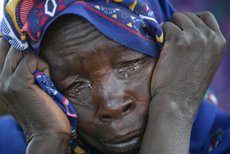Restrictions on aid workers were lifted and a state of emergency was declared null after rebels pulled out from their occupation of Tawilla town in North Darfur, a Nov. 27 report from El Fasher, Sudan said. The attack is just one in a civil war spanning 11 years. Practically every road leading out of El Fasher, the North Darfur state capital, were off limits to aid workers due to security concerns during the conflict that began at dawn on Nov. 20.
According to Reuters, the Janjaweed attacked Tawilla town, killing almost 30 police officers in their attempt to seize control. Civilians and aid workers said the government responded with air strikes, which rebels said included the bombing of a nearby Sudan Liberation Army (SLA) base camp in a village called Thabit.
More than 1,500 metric tons of food, scheduled for delivery by the World Food Program during the week of Nov. 27 sat in a warehouse until the most recent surge of violence was under control. Aid workers are now free to deliver the food, but the threat of more violence looms.
Dominik Stillhart, head of a delegation for the Sudan office of the International Committee of Red Cross in Khartoum told The New York Times “There is increasing disintegration of the political landscape in Darfur. There are two overlapping conflicts. You don’t know today which one is fueling the other one.”
After years of conflict between Arab nomads and mostly non-Arab farmers over scarce resources in Darfur, rebels took up arms in February 2003 after accusing Khartoum of neglect and of arming the Janjaweed to loot and burn non-Arab villages.
The Times reports that while the Sudanese government admits to arming some militias to fight the rebels, it continues to deny a link to the Janjaweed, referring to members of the group as “outlaws.”
The United Nations condemned the attacks orchestrated by the Janjaweed because the move violated security protocols signed Nov. 9 between the Sudanese government and Darfur rebels in the Nigerian capital Abuja.
Rebel leaders insisted that the attack was in response to the government’s failure to uphold the cease-fire agreement. “We are just defending ourselves,” Sulieman Jamous, a senior SLA field commander told the Times. “We are still on our promise.”
The U.N. said the rebellion has triggered one of the worst humanitarian crises in history with more than 1.6 million people forced out of their homes in the region of Darfur.
The U.N. has also threatened Sudan with sanctions if it fails to stop the violence which U.S. officials are calling genocide. The World Health Organization reports that more than 70,000 deaths have occurred from malnutrition and disease in Darfur since March.
On his first trip abroad since taking office, European Commissioner for Development and Humanitarian Aid Louis Michel told New York Times reporters, “The security situation is of course very sensitive, but I think there’s a very slow improvement.

